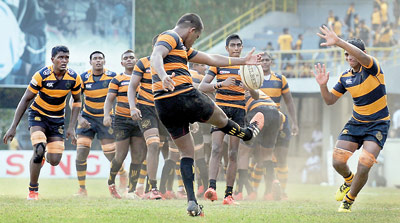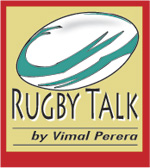Schools’ Rugby gets underway

Royal hosted DSS in the opening game - Pic by Amila Gamage
Schools rugby is season has begun. The games take a break for the Holy Week and there will be two more breaks for the New Year and for Wesak seasons. Considering the heat wave the country is facing the breaks are good.
Even without a heat wave breaks is good for young athletes who are being pushed to an extent of near exhaustion in the quest of performance.
The first week saw those who were at the last line last year emerging as serious contenders: except Dharmaraja who stood no chance against Isipathana. They relied on support play as against last year where most play was centered on one man. It was nice to see the ball being carried in both hands and opting a pass to either side.
The team play was evident when Chamod Fernando who scored three tries off-loading to another player without being selfish and adding to his tally. In the first outing they showed a glimpse of what they are capable of by running and passing the ball around with a lot of support coming along. Why I say a glimpse is because the side does not seem to have much weight and we will have to see how they will play against bigger teams. My thinking is that the running and passing with a lot of support play will compensate for weight and also to keep the ball away from the bigger made forwards of other teams. It is a wait and see situation as we take a break and look forward for some good rugby.

S. Thomas’, who won the Schools Sevens title this year, denied the Joes with a defeat by a bigger margin as they played like a pack of novices in the first half. They were over the line on two occasions and managed to drop the ball and also were good in passing the ball forward on another two occasions with the line starring. Having scored in almost the last minute in the first half the Mount team took the break leading by 5 points to 3. The lemons would have been sweet to the Joes who were comfortable. In the second half S. Thomas’ got their act together and played more cohesive rugby to win the match and the Lady Jayatilleke Shield by 32 points to 3. Joes who held in the first half looked a jaded side unable to capitalise on the morale boosting first half. This is the first match of the season and they need to take stock to last an 80 minute game if they are to make an impact and be among the first eight.
Wesley, who finished at the bottom of the barrel, were very much unlucky and went down to Trinity by 7 points to 5. The Lions’ victory was almost at the last whistle and they were lucky to win this match. They will have to look sharp as the season progress. Wesley proved that they are no pushover but need to put points on the board and look at converting penalties that are within kicking range, to scores.
St. Anthony’s Katugastota, having been led in the first half, rallied to fight out with Science in a game that they may have won if they did not leave holes in the back line which allowed Science to run and score and win. Nevertheless I would say that the Antonians will be a tough side to beat in Division 1 Segment B.
Royal too was made to puff by promoted DSS with a score of 17 to 10 at lemons. Royal came back in the second half to win by 36 points to 10, a margin that is not enough to be said that it was a convincing win by the champions of last year. St. Peter’s was the other side that came up with a convincing win of 35 points to 18 against Kingswood Kandy. Something that caught my eye was the ability of Thikshana Dassanayake and Sivraj Stephen to fend off a player. The effective fend off or a hand off as we call is something that is not seen much these days.
In general the penalty count by teams is something that coaches should be worried about. Most revolve around the break down and include release at the tackle as well as not staying on the feet. Another area is the collapsing of a maul that is moving forward. This is done repeated by some teams who were lucky not to shown a yellow card. Another concern is the tendency to send back players who are at a risk from head injuries. People tend to quote the use of a temporary bin and claim this is done in international matches.
The Law trials of 2015 stated that “Tournaments approved by the Union or Rugby body having jurisdiction and with trained healthcare professionals, a temporary replacement may be used for a player who has a head injury and the diagnosis is not clear”.
The inclusion of this trial as a law in 2016 laws of the game has gone further in interest of safety and says (3.12), If at any point during a match, a player is concussed or has suspected concussion, that player must be immediately and permanently removed from the field of play. This is known as “recognize and remove”.
The law goes on to say in elite adult matches only, which have been approved in advance by World Rugby for the use of Head Injury Assessment and this temporary replacement procedure.
The safety aspect in the law is a strong must be immediately and permanently removed.
I also noticed an issue of where 16 players were on the field and the consequent altercation by the team management putting the blame on the substitution official. In this context it is worthy of looking at the how World Rugby reacted to NZ fielding eight men on the field in a Seven Series in the recent World Series.
The games governing body inquired into the issue and the statement read saying “it would not punish the team as the breach was not an intentional attempt to cheat”. It went on to say “It was an inadvertent breach as a consequence of a number of factors relating to the management of replacements involving a number of parties,” the statement reads. The important point here is the initial reaction of looking at the team management and the possible intention. While officials are there to facilitate the game the team management too has a vital role to play was the way World Rugby thought.
* Vimal Perera is a former player, coach, referee and an IRB Accredited Referees’ Educator


